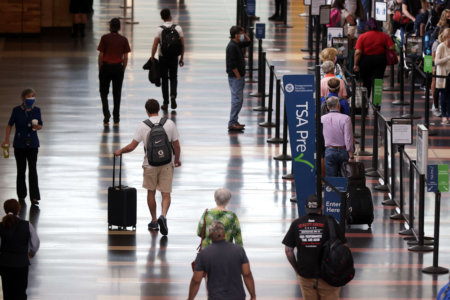
If you’re an international student in the UK with Christmas or New Year’s plans ready, you might want to think twice before proceeding. UK travel restrictions — for those going in and out of the country — are now in place following an alarming rise in COVID-19 cases, after the Omicron variant resulted in a swift rise of infections.
The UK’s number of confirmed daily cases were 91,743 on December 20, according to the BBC. London was declared a “major incident” by Mayor Sadiq Khan as the city records the highest number of cases in the UK.
• Israel bans travel to US and Canada over Omicron concerns
• Germany tightens restrictions on UK travellers🔵 Follow our LIVE blog for the latest updates: https://t.co/fs4158Nc3i pic.twitter.com/3d2v4kAzVv
— Al Jazeera English (@AJEnglish) December 20, 2021
There’s no reason to dampen the holiday spirit just yet, though. As international students, you should exercise further caution and stay in the loop about the latest Omicron-related UK travel restrictions.
That’s why we’ve compiled a quick list of updated travel mandates for travellers from the UK, so you can plan a safe and meaningful holiday. Here’s what you need to know:
Leaving and entering campus
Before you leave, check your campus policies on leaving and returning after the holidays. Your education provider could have its own regulations and advisory guidelines for students ahead of Christmas and the New Year’s.
If you’re going abroad, travel restrictions on re-entry to the UK could affect your return. For more information about travelling as an international student in the UK, check out this list from the UK Council for International Student Affairs.
UK travel restrictions: If you’re coming from Asian countries
India
If you’re an Indian student heading home for the winter break, take note that you’ll have to get tested on arrival at the airport, and quarantine at home for seven days, as reported in The Telegraph. You’ll need to take another test on day eight and self-monitor your health for the following seven days. The quarantine time frame will affect the duration of your stay with family members, so plan wisely before proceeding with your travels.
Updated guidelines for travel to India as announced on 28 November 2021.https://t.co/xjwCCEu0mz https://t.co/JwKnhiy2gZ pic.twitter.com/7RLK73LgKN
— India in the UK (@HCI_London) November 29, 2021
Hong Kong
The UK has entered Hong Kong’s list of “high risk places”, and only travellers who are fully vaccinated may enter. Other travellers who have visited the UK or high-risk countries within 21 days before arrival will be barred from entry. There’s a catch for successful entrants, however: you’ll need to undergo a lengthy 21-day isolation at a designated hotel, plus an extra seven days of self-monitoring.
From 21 Dec., any visitor who has been in the UK in the past 21 days will be required to spend the first 4 days of quarantine in the HK Govt’s quarantine facility, Penny’s Bay. They will then transfer to their designated quarantine hotel to complete their 21 days of quarantine.
— UK in Hong Kong 🇬🇧 (@UKinHongKong) December 21, 2021
China and Japan
Few countries have had uncompromising border policies as China and Japan throughout the pandemic. Both countries are still shut off to all international travellers. Japanese citizens and residents are permitted entry, but must quarantine in designated facilities. China remains closed to most foreigners, except for certain business or diplomatic travellers.
UK travel restrictions: UK enters the red list in several European countries
France
You can say goodbye to Paris and the Alps for now: France has effectively banned UK travellers, The Telegraph reports. Only residents of France and those with “compelling reason” from the UK are allowed entry starting from 11 p.m. on December 17.
The news comes as a blow to ski enthusiasts, who’ve been looking forward to the start of the ski season at the Alps. That hasn’t stopped UK travellers from last-minute purchases though: flight, ferry and Eurostar tickets were sold out after the French government’s announcement on Thursday.
UK travellers are to be banned from traveling to France for tourism and will instead be required to present a “compelling reason” to enter the country https://t.co/D0GzqQgrSc
— CNN International (@cnni) December 16, 2021
Our thoughts go to all the British skiers who were looking forward to enjoying the French Mountains this Christmas & New Year. We hope the travel ban will end soon. pic.twitter.com/539IpK76Tx
— French Mountains (@FrenchMountains) December 17, 2021
Germany
German Christmas markets could be off from your itinerary too, as the country has swiftly followed in France’s footsteps. Currently, only German nationals and residents from the UK are allowed entry, effective December 19, the BBC reports. Travellers must produce a negative test and proceed with a two-week quarantine, whether vaccinated or not.
COVID-19: Germany announces quarantine for travellers from UK https://t.co/vxPFjUIWbT
— Sky News (@SkyNews) December 18, 2021
Italy and Greece
All travellers to Italy and Greece will need to produce a negative COVID-19 test before arrival, according to CNN. A negative PCR test must be taken within 48 hours before arrival in Italy, while fully vaccinated travellers can take an antigen test no more than 24 hours prior to departure as an alternative. Travellers to Greece must have a negative PCR test taken within 48 hours before departure.
Portugal
Meanwhile, Portugal has introduced mandatory testing for all travellers arriving by flight, with Denmark and Norway introducing new travel restrictions to stall infection rates, CNN reports.
Wherever you decide to spend your holidays, do remember to exercise caution and follow safe COVID-19 protocols. Getting your own self-test kit isn’t a bad idea either. Just make sure you’ve taken all necessary precautions in place to have a memorable holiday with friends and family.










